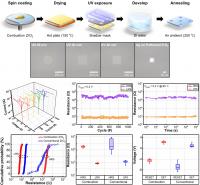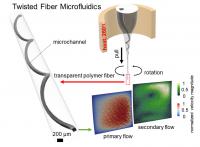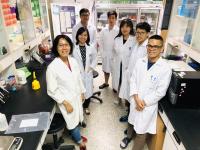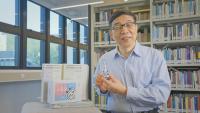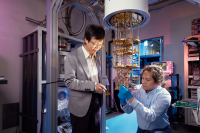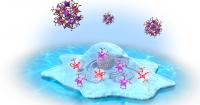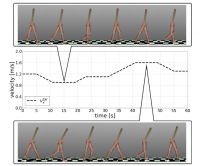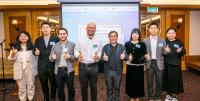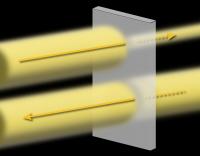Content is provided by our community of institutions, partners, researchers and journalists.
Hokkaido University
29 Jan 2024
A new technology to increase visibility of cancer cells to the immune system using CRISPR has been developed, and could lead to a new way to treat cancer.
MAP Academy
29 Jan 2024
Nestled in northern Karnataka, the Badami cave temples of India are adorned with a unique blend of intricate carvings that draw religious motifs from Shaivite, Vaishnavite and Jain traditions. Learn more about these 2nd-century rock-cut shrines that bear testament to ancient Indian royal patronage and religious syncretism.
Asia Research News
26 Jan 2024
Asia Research News monitors the latest research news in Asia. Some highlights that caught our attention this week are a closer step towards artificial spider silk, rocks made from plastic, and why a flightless dinosaur developed small wings.
The Education University of Hong Kong (EdUHK)
26 Jan 2024
The Education University of Hong Kong (EdUHK) secured three awards at the 3rd Asia Innovation and Invention Exhibition (AEII). This is the first time EdUHK has entered inventions at the AEII, and the three projects presented captured the attention of industry experts.
Daegu Gyeongbuk Institute of Science and Technology (DGIST)
26 Jan 2024
- Joint research team of DGIST (Prof. Dae-hyun Nam, Youn-gu Lee) - Sogang Univ. (Prof. Seo-in Back) developed a new catalyst for electrochemical reduction of carbon dioxide using “vitamin C boosting copper nanowire”
- Utilizing the jointly developed catalyst accelerates conversion from carbon dioxide to ethylene, enabling mass production of ethylene
- Findings published in the prestigious academic journal, “Nature Communications”
Daegu Gyeongbuk Institute of Science and Technology (DGIST)
26 Jan 2024
- Professor Kwon Hyuk-jun’s research team at DGIST develops a low-temperature solution process through exothermic response-induced combustion synthesis and implements synapse-simulating non-volatile semiconductor memory
- It is expected to be applied to next-generation computing systems because of its superb durability and data storage capabilities even in high temperature
Daegu Gyeongbuk Institute of Science and Technology (DGIST)
26 Jan 2024
- DGIST Prof. Kim Sohee and team develop soft, flexible, and highly durable brain electrode technology.
- Expected to be used in brain-machine interfaces without causing tissue damage, and to treat brain diseases.
Daegu Gyeongbuk Institute of Science and Technology (DGIST)
26 Jan 2024
- DGIST Prof. Park Jin-hee and her team detected unknown sample components by analyzing color change patterns and developed a technology that allows analyzing concentrated amounts through a mobile phone camera
- Expected to secure source technologies and open new avenues in the environmental sensor field
Daegu Gyeongbuk Institute of Science and Technology (DGIST)
26 Jan 2024
- DGIST’s Dr. Yun JinHyo and team have, jointly with research teams from Japan and Italy, found a path to sustained innovation in the service industry using business models.
- Findings have been published in the world-renowned European Journal of Innovation Management (EJIM, SSCI, Q2)
Tohoku University
26 Jan 2024
A team of researchers have opened new possibilities in bioanalytical application by developing a microfluidic device that allows for the precise and efficient manipulation of fluids in three-dimensional microscale environments.
Hiroshima University
26 Jan 2024
Corrugated wings exhibit larger lift than flat wings
Newcastle University in Singapore
25 Jan 2024
Researchers from Thailand have pioneered the conversion of waste HDPE milk bottles into high-stiffness composites, utilizing PALF reinforcement for a 162% increase in flexural strength and 204% in modulus. This eco-friendly upcycling boosts mechanical properties while sequestering carbon, presenting a promising path for sustainable materials.
Science Media Center Taiwan
25 Jan 2024
Taiwan: Researchers from National Chung-Hsing University, Taiwan, have made a discovery in the fight against Zika virus. Their study, published in the journal “Communication Biology,” reveals that people who have previously been exposed to dengue virus and Japanese encephalitis virus may have acquired immunity against Zika virus. This finding may shed new light on vaccine strategies in countries where these viruses are common.
Lingnan University (LU)
25 Jan 2024
Lingnan University’s Advanced Institute for Global Chinese Studies (AIGCS) will launch a new series of How to Read Chinese Poetry, on 1 March 2024. This knowledge transfer project promotes Chinese literature and culture globally, narrating Chinese stories through poetry. The new programme is presented in three series: “Chinese Videos: Sounds of Tang Poetry”, “English Videos: From the Book of Poetry to Qing Dynasty Poetry”, and “Chinese Videos: From the Book of Poetry to Qing Dynasty Poetry”. The first two series were released in 2023, and have been viewed two million times.
Academia Sinica
25 Jan 2024
With computation potential far beyond current supercomputers, quantum computers are the subject of enthusiastic research and development worldwide. In 2023, Academia Sinica successfully overcame various bottlenecks in the fabrication, control, and measurement of quantum chips. In October, the creation of a 5-qubit superconducting quantum computer developed in Taiwan marked a significant milestone. Starting this week, it will be made available online to project collaborators.
24 Jan 2024
This week sees the launch of the first published content in Sustainable Microbiology, the new open access journal which will apply microbiology to sustainability. The journal is published by Applied Microbiology International.
Osaka University
23 Jan 2024
Researchers from SANKEN (The Institute of Scientific and Industrial Research), at Osaka University developed an optical sensor consisting of carbon nanotube photodetectors and organic transistors formed on an ultrathin, flexible polymer film. A wireless system reads the images from the sensor. Experiments showed the sensor has high sensitivity, a wide bandwidth, and robustness to extreme deformation such as bending and crumpling. This sensor has high potential for use in applications such as non-destructive imaging, non-sampling liquid quality evaluation, wearable devices, and soft robotics.
Tohoku University
23 Jan 2024
Scientists are eager to harness the unique electrical properties of topological magnets for advancing thermoelectric materials. A collaborative research group has successfully induced positive and negative polarities, unlocking the potential for generating thermoelectric energy from materials with topological magnet properties.
Asia Research News
23 Jan 2024
A one-stop resource for expertise and science is now available. Get tip sheets for research stories from Asia.
Tohoku University
23 Jan 2024
The Hayabusa2 mission that collected samples from the asteroid Ryugu has provided a treasure trove of insights into our solar system. After analyzing samples further, a team of researchers have unearthed evidence that cometary organic matter was transported from space to the near-Earth region.
Lingnan University (LU)
23 Jan 2024
To strengthen connections with alumni and showcase the university's rich history and accomplishments, Lingnan University in Hong Kong has initiated a series of alumni interview activities. The first session, led by Prof S. Joe Qin, President and Wai Kee Kau Chair Professor of Data Science of Lingnan University, featured a conversation with distinguished alumnus and renowned economist Prof Gregory Chow Chi-chong in the US.
Hokkaido University
22 Jan 2024
A water-soluble, luminescent europium complex enables evaluation of malignancy grade in model glioma tumor cells.
Tohoku University
22 Jan 2024
We may not think about it while doing it, but our nervous system is directing our bones, joints, muscles, tendons, and more to move as efficiently as possible at varying speeds. Replicating this in robots is notoriously difficult. But now, Tohoku University researchers have created a model that makes this possible, thanks in large part to an innovative algorithm.
Lingnan University (LU)
20 Jan 2024
Lingnan University held the kick-off ceremony for the 2nd Postgraduate Mentorship Programme on campus today (20 January). About 200 postgraduate students and mentors attended the event, which helps graduating students navigate employment challenges in Hong Kong's rapidly evolving and competitive environment. The programme shows mainland Chinese and overseas non-local students how to adapt strategically to Hong Kong's culture, make smart career choices, and unleash their full potential in the job market.
Asia Research News
19 Jan 2024
Asia Research News monitors the latest research news in Asia. Some highlights that caught our attention this week are watching plants warn each other of danger, how even “harmless” addictions can have a serious side effects, and how to clear roads and railways faster using gold nanorods.

Hokkaido University
19 Jan 2024
Temperature-controlled, reversible shifting of molecular gear motion in a solid crystal opens new possibilities for material design.
Academia Sinica
19 Jan 2024
A recent paper published in the journal Astronomy & Astrophysics presents new images from the 2018 data that reveal a familiar ring the same size as observed in 2017. This bright ring surrounds a deep central depression, “the shadow of the black hole,” as predicted by general relativity. Excitingly, the peak brightness of the ring has shifted by about 30º counter clockwise compared to its position in 2017, which is consistent with our theoretical understanding of the variability of the turbulent material around black holes.
Lingnan University (LU)
18 Jan 2024
Lingnan University’s School of Graduate Studies recently invited Dr Miguel Antonio Lim, Senior Lecturer in Education and Research Excellence Framework (REF) coordinator at the Manchester Institute of Education, to deliver a thought-provoking presentation on “Ethical Internationalisation in Higher Education and the Need for Understanding ‘South-to-South’ Student Mobility” at a seminar. Dr Lim is well-known for his extensive research in international and transnational higher education.
Tohoku University
18 Jan 2024
Researchers at Tohoku University have developed guidelines for a single-nanometer magnetic tunnel junction (MTJ), allowing for performance tailoring to meet the requirements of diverse applications, ranging from AI/IoT to automobiles and space technologies.
Osaka Metropolitan University
18 Jan 2024
A research group led by Osaka Metropolitan University has discovered significant nonreciprocal optical absorption of LiNiPO4, referred to as the optical diode effect, in which divalent nickel (Ni2+) ions are responsible for magnetism, by passing light at shortwave infrared wavelengths used in optical communications. Furthermore, they have uncovered that it is possible to switch the optical diode effect by applying a magnetic field. This is a step forward in the development of an innovative optical isolator that is more compact and can control light propagation, replacing the conventional optical isolators with complex structures





